Spring 2022
Spring 2022 CMRS-Affiliated Courses
**Please note: CMRS plans to once again implement a mix of in-person and remote coursework for the Spring 2022 term. Updated 12/20/2021 (list is subject to change).
Spring 2022 MEDREN Courses
MedRen 2666 - Magic and Witchcraft in the Middle Ages and Renaissance
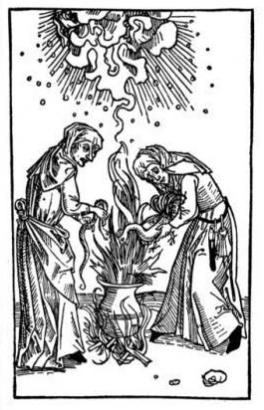
Description: In this interdisciplinary course, students will explore the history and culture of witchcraft and magic in Europe from about 400 C.E. to 1700 C.E., including examination of its religious, intellectual, and sociological contexts. As students gain basic knowledge of the history of witchcraft and magic during these periods (both actual practice and contemporary beliefs about that practice), they will develop some ability to understand why these practices and beliefs developed as they did and what societal and cultural needs drove them.
Prereq: Not open to students with credit for Medieval 240. GE culture and ideas and diversity global studies course.
Class: 23336
Time: T-Th 2:20-3:40
Room: 220 Sullivant Hall
Instructor: Michael Swartz (Near Eastern Languages & Cultures)
Required Books: Kors, Alan Charles and Edward Peters, eds. Witchcraft in Europe, 400-1700: A Documentary History. 2nd ed. Philadelphia: U. Penn Press, 2000.
MedRen 3194 - Group Studies: Robin Hood (CANCELLED - PLAN TO SCHEDULE IN 2022-2023 AS REGULAR COURSE OFFERING)
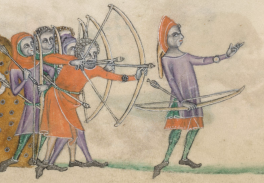
Description: This course introduces students to key texts, documents, and other artifacts that are the traces of the medieval and Early Modern Robin Hood tradition, as well as the research skills, scholarly methods, and interpretive frameworks required to make sense of them. Through readings of both primary and secondary materials, weekly writing, discussions, interpretive exercises, explorations of key library and internet resources, and other activities, students will strengthen a wide array of core abilities required for humanistic study of pre-modern cultures. Because Robin Hood was widely known throughout the British Isles starting in the late-medieval era and continuing through to the present, traces of the tradition survive in an unusually diverse array of genres and media that were shaped by almost every sector of society. Making sense of each artifact and then synthesizing those insights into an understanding of the phenomenon can make use of all the practices that medieval and early modern study employs across the various disciplines that comprise it. Further, because Robin Hood survives as a widely known figure in our own time, study of the early tradition provides a privileged opportunity to examine the ongoing influence of early English history.
Class: 36789
Time: synchronous meetings on Zoom Th 3:55-5:15; other discussions, recorded lectures, etc. delivered asynchronously online.
Room: ONLINE
Instructor: Henry Griffy (Distance Education and E-Learning)
Required Books: TBD
MedRen 4504 - The Arthurian Legends
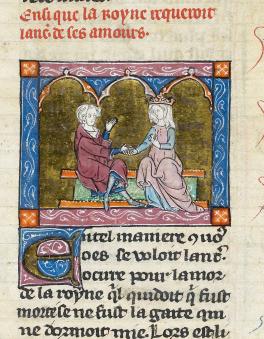
Description: In this asynchronous online course, we will explore together the wondrously rich and complex Arthurian tradition that flourished during the Middle Ages. We will encounter the wild and crazy heroes of Welsh romance and the earliest incarnations of characters who remain a part of our popular culture, such as Merlin, Lancelot, Gawain, Guinevere, the Lady of the Lake, and Morgan le Fay. Though our focus is medieval texts, we will also look at the ongoing modernization of Arthurian characters, stories, and themes in literature, games, and film, and we will explore the use of Arthurian materials in contemporary conversations about race, gender, sexuality, and a host of other issues.
The structure of this course mimics the common structure of Arthurian romance: Arthur’s champions set out from Camelot on some quest and have a series of adventures. After they “achieve” their quest, they return to Camelot and share their experiences. Each week of this course you will embark on a quest, which you will achieve by mastering the readings and video lectures, then taking a quiz and completing a series of challenges—you may be sent on a fact-finding or artefact-gathering mission or you may be asked to solve a puzzle based on the readings. You will always be asked to reflect, in a paragraph or two, on an interpretive crux raised by the week’s reading and to share your reflections with your fellow questers. These weekly quests will constitute the bulk of your grade. For your final project, you will put your knowledge of the medieval Arthurian tradition in conversation with a contemporary work of Arthuriana.
Prereq: 6 cr hrs in literature.
Class: 34208
Time: N/A
Room: ONLINE
Instructor: Karen Winstead (English)
Required Books: The Romance of Arthur, ed. Norris J. Lacy and James J. Wilhelm
ONE of the following: Legendborn, a novel by Tracy Deonn (2020); Sword Stone Table: Old Legends, New Voices, a collection of short stories, edited by Swapna Krishna and Jenn Northington (Vintage Books, 2021); Arthurian Things: A Collection of Poems, by Melissa Ridley Elmes (Dark Myth, 2020).
MedRen 5631 - Survey of Latin Literature: Medieval and Renaissance
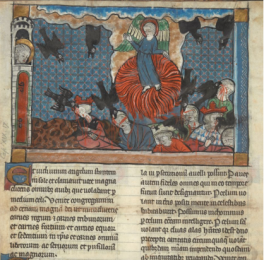
Description: Intermediate Latin students will hone their translation skills while exploring major literary genres (saints' lives, travel literature, fables, schoolroom texts, poetry and more) and learning about literacy and manuscript culture in the Medieval West (circa 400-1500 CE)..
Prereq: Latin 1103, or equiv.
Class: 34327 (UG section), 34329 (Grad section)
Time: W-F 12:45-2:05
Room: 359 Hagerty Hall
Instructor: Leslie Lockett (English)
Required Books: None. Students might need to print out a packet of readings that will be posted on Carmen.
MedRen 5695 - Advanced Seminar: Neighborhood, Space, and Urban Identity in Shakespeare's London
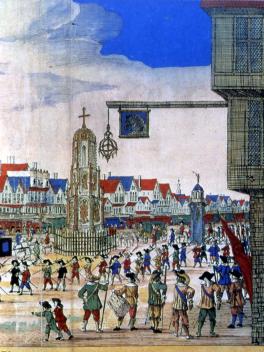
Description: This seminar is an interdisciplinary course that examines the growth of London in the period after the Reformation and its distinctive institutional and cultural spaces. We will use a variety of primary documents, including maps, plays, pamphlets, and parish records to explore the ways in which Londoners made sense of their urban surroundings and brought the sprawling metropolis under control. We will look at important sites of cultural production like the Bankside theater district, as well as the Inns of Court (London’s legal quarter), and St Paul’s Cathedral where the book trade was centered and where crowds heard the land’s best preachers. We will also spend time in Cheapside (the commercial center of the City), on the Strand (the spacious thoroughfare that linked London to Westminster and that became a byword for wealth and fashion), and in the open spaces on the fringes of the city that attracted serving women, apprentices, and the destitute.
Throughout the semester we will work closely throughout the semester with the online Map of Early Modern London: https://mapoflondon.uvic.ca/ This fantastic resource is organized around a highly detailed, zoomable, sixteenth-century map of the city. Students will have the chance to write entries for the placeography and make other contributions which could potentially be published on the site.
Students will come away from the course with a vivid sense of London’s cultural topography in this period, especially its defining cultural spaces and their communities of writers, actors, and audiences.
Prereq: 6 credit hours in MedRen at the 2000 level or above. Repeatable to a maximum of 9 cr hrs.
Class: 19870 (Grad section), 19871 (UG section)
Time: T-Th 11:10-12:30
Room: 455 Hagerty Hall
Instructor: Chris Highley (English)
Required Books: None
MedRen 7899 - Medieval and Renaissance Colloquia
Description: MEDREN 7899 will consist of 1 credit hour per semester for attending CMRS lectures, faculty colloquia and subsequent discussions. This will amount to: 4 1-hour+ lectures by visiting professors and at least 1 internal lecture and subsequent discussion (total 3 hours per event); at least one lunch with visiting faculty member (2 hours); active involvement with MRGSA and its activities; and meetings with the Center director (one hour once per term). With permission of the Director other professional activities (such as attendance at appropriate conferences, on- or off-campus) may be substituted. **Please consult with CMRS director Chris Highley before registering, given potential deviations from the standard plan above due to the current pandemic.**
Prereq: Grad standing. Repeatable to a maximum of 3 cr hrs. This course is graded S/U.
Class: 19867
Time: generally F 4:00-6:00 (in line with scheduled lectures and faculty/student colloquia)
Room: Varies, and some events may be held virtually due to the ongoing pandemic
Instructor: Christopher Highley (English)
